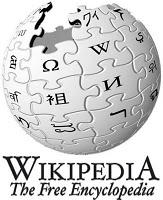 Wikipedia turned 10 this month. The online, user-controlled encyclopedia is one of the favorite websites of this blog (as many readers will know from the numerous links to the site's articles). The distinguished news magazine, The Economist (perhaps the best of its kind), recently included two articles about Wikipedia discussing its rise and relevance over the last decade and the growing editing clique that has made contributing to the site a sometimes (but more and more) vicious experience. The Man is going to write a post addressing the culture and experience of being an active Wikipedia contributor, while I'm going to write on how I use the site and how useful it is in my information gathering.
Wikipedia turned 10 this month. The online, user-controlled encyclopedia is one of the favorite websites of this blog (as many readers will know from the numerous links to the site's articles). The distinguished news magazine, The Economist (perhaps the best of its kind), recently included two articles about Wikipedia discussing its rise and relevance over the last decade and the growing editing clique that has made contributing to the site a sometimes (but more and more) vicious experience. The Man is going to write a post addressing the culture and experience of being an active Wikipedia contributor, while I'm going to write on how I use the site and how useful it is in my information gathering.---
One Stop Shop
Google virtually any topic, go ahead, try diverse subjects like string theory, Albert Pujols, London, The Godfather, you'll see the link to the associated Wikipedia article within the first few pages listed, if not the first. Currently, Wikipedia offers more than 3.5 million articles in English alone, which has to be far more than even the most comprehensive of traditional encyclopedias. And the returns from a Google search attest to the site's popularity. I can go to Wikipedia and be confident of finding an article on almost any subject I desire...that's useful. What I also like is that Wikipedia doesn't discriminate about the articles included. Sure extensive and numerous articles are devoted to serious academic subjects like say, biology, but articles are also included on mundane topics like Andy Samberg's and Justin Timberlake's hilarious spoof video, "Dick in a Box". This blogger loves the serious and the mundane, so it would follow that I would love a site that caters to my diverse interests.
Further, what Wikipedia is all about is the free sharing of knowledge. A complete listing of every The Simpsons episode will not change the intellectual landscape, but surely having that information easily available, no matter how seemingly inconsequential, enriches human knowledge.
And while the standard knock on Wikipedia is that it's littered with inaccuracies and bias, I've found that when reading about the topics I know well, it gets the facts pretty much correct. Beyond that, Wikipedia's standards for citing and references tend to identify claims and statements that are either unsupported (which is okay for a lot of subjects) or provides helpful links and references that can be used to validate information and pursue additional investigation. And of course, Wikipedia does get things wrong, but really, the site's overall accuracy comes close (if not virtually equal) to many supposedly authoritarian and rigidly reviewed academic and professional sources.
A Chain of Interest

...World War II to The Simpsons

Only with Wikipedia can I link...
One of the ways that I love to use Wikipedia is to follow what I term a "chain of interest". Let's start with a huge subject like World War II. Through Wikipedia's linking, I could jump from World War II to the Manhattan Project, then read about the Trinity Test in New Mexico, which I can then follow to the subject of nuclear fallout, the building of fallout shelters, a depiction of a fallout shelter in The Twilight Zone episode "The Shelter", and finally the parody of that episode in the terrific The Simpsons episode "Bart's Comet" where the town of Springfield takes shelter in Ned Flanders' backyard bomb shelter. Not only do I get to follow my chain of interest, but I also get to link World War II and The Simpsons, the serious and the mundane. Only with Wikipedia.Keeping Pace

Wikipedia confirms, Pluto is no longer a planet
Online resources are so valuable because they can be so easily and quickly updated. The last time my family bought hardback encyclopedia's was in 1994. The minute they arrived at our house they were out-of-date. Wikipedia has no such issues. I remember when Pluto was demoted to a dwarf planet and a fifth ocean was added to the world. These changes were reflected in Wikipedia almost (seemingly) as soon as they were announced by the news media. For any subject where there are major developments or where interest is really keen, the Wikipedia article is updated almost immediately, ensuring that facts are up-to-date and discussions current. Do you know who won the Men's Singles title at the Australian Open today (1/30/11)? Wikipedia does.Presentation and Consistency
Finally, I have to credit the designers and editors of the site who have provided style and content guidelines that allow for a consistent look and organization of all pages. This allows for much simpler navigation and information scanning, and ultimately a more comfortable reading and researching experience.
The Future
I hope that Wikipedia continues to prosper. The questions about funding, declining numbers of active contributors, and resistance by academic and other rival information resources are not to be dismissed lightly. But hopefully, Wikipedia can continue to mature and become an even more valuable repository for information and research. Wikipedia is a great contributor to human knowledge, we should celebrate this birthday and hope for many many more.

